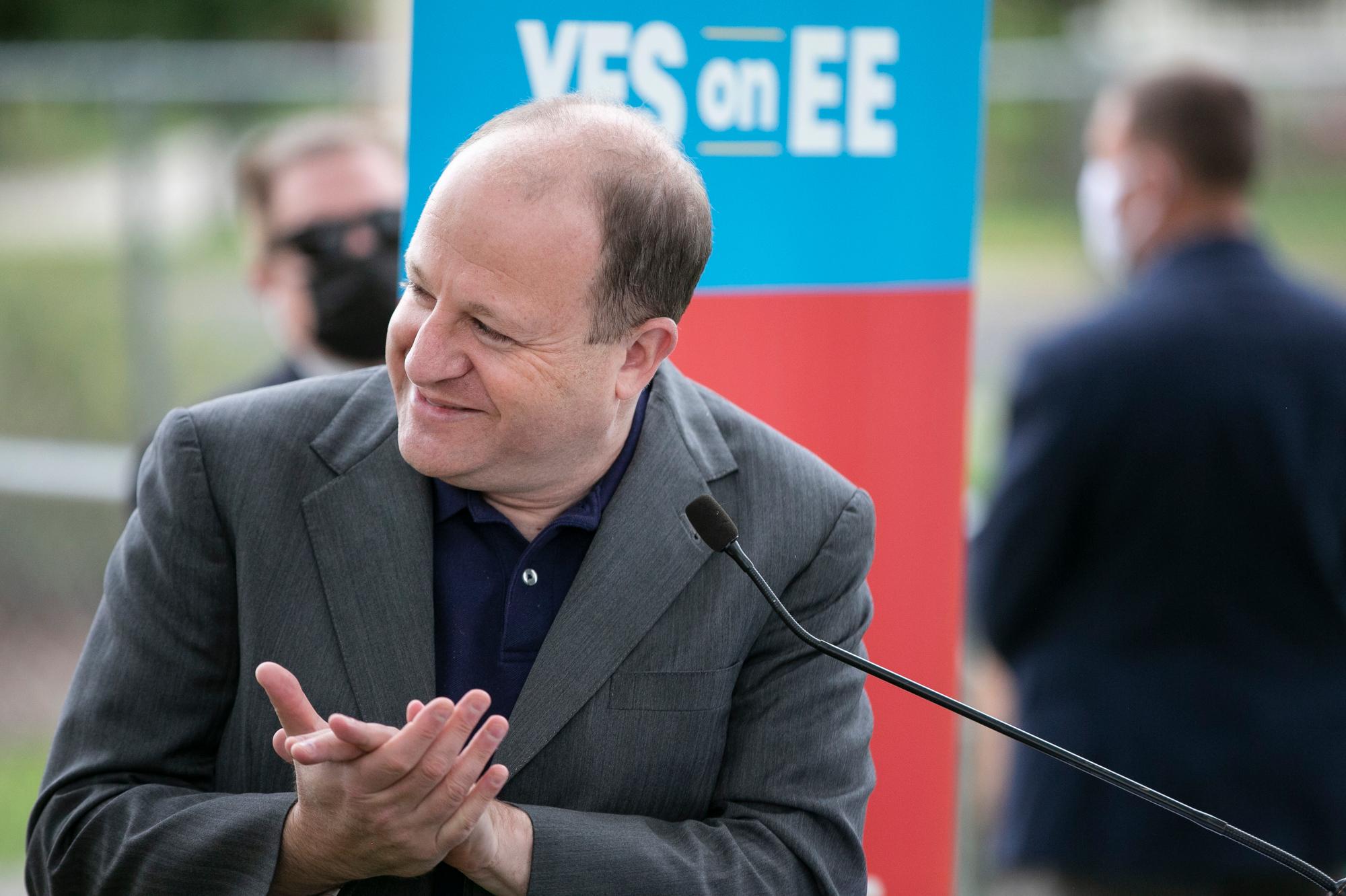
Democratic Gov. Jared Polis will head into the state’s next legislative session with some of his top priorities already achieved, thanks to Colorado voters.
The passage of a ballot measure to lower income taxes and another that raises funds for universal preschool potentially heads off brewing intra-party disagreements with the Democratic-controlled legislature. Lawmakers are likely to have different views on how limited funds should be budgeted during the pandemic.
In an interview with CPR after the election, Polis cheered the passage of Prop 116, the conservative-backed income tax cut. The position aligns him more with Republicans than with other leaders in his own party. He said it will provide economic relief to individuals and small businesses. Other Democrats see it as a tax giveaway to the wealthy that could cut critical state services.
“We would love to cut the income tax more,” Polis said. “But even with what the voters did, we’re interested in working with them to backfill it by eliminating tax loopholes and tax expenditures, to make sure that there's no revenue loss to the state by reducing the income tax level.”
Legislative analysts estimate the income tax cut will cost Colorado’s budget $150 million next fiscal year. But Polis notes that given the totality of the measures voters passed, the state budget will actually see a net increase.
When it comes to working with the legislature in 2021, not much will change for the governor. Democrats will remain in the majority, picking up just one seat in the state Senate.
Reflecting back on the contentious national election season, Polis said it’s now time for the country to heal.
“Elections are done. There will be winners declared and people will take office. It's time to work together to make Colorado and America an even more amazing place.”
State will play by some new financial rules
Colorado voters made a number of changes this fall that will have long-term ramifications for how the state governs itself and how much money stays in people’s pockets and the state’s coffers.
As voters reduced income taxes, they approved a tax on tobacco and vaping products that will eventually fund full-day preschool — although the money will first be earmarked to off-set any education funding cuts necessitated by a pandemic-induced recession. Only four years ago, another measure to raise tobacco taxes failed on the statewide ballot.
“Clearly voters across the board — Republican, Democrat, Independent — said, ‘you know what, kids should be able to get preschool and just because the parents might not be able to afford it or don't prioritize, it doesn't mean those kids should start out with a disadvantage,’” Polis said.
The governor also thinks voters were responding to an unintentional loophole that has allowed vaping products to avoid taxes.
“Vaping sort of came in and didn't exist 10 years ago and now exists. And so there was never any tax. So in effect, it's subsidized relative to cigarettes and cigars that pay the nicotine tax.”
And he’s also pleased that Colorado voters repealed the Gallagher Amendment, which originally passed in 1992. The goal was to ensure businesses, not residential homeowners, paid most of the state’s property tax bills. But it later combined in unexpected ways with the Taxpayer’s Bill of Rights and significantly reduced residential property tax rates.
“I was excited that we finally fixed and closed this crazy Gallagher Amendment thing that locks in these tax increases for small businesses.”
However, Polis is not cheering everything that passed last Tuesday. The new voter-approved paid family leave program is based on a model that the governor has opposed — taking money out of workers’ paychecks to support a state-run program. Last year, Polis put his weight behind the idea of simply requiring employers to offer the benefit, without the state getting directly involved in providing it.
“It wasn't the way that we would have done family leave in Colorado,” he said of the voter-approved plan. “We wanted to see it sooner than 2024, but the voters have had their say and we are ready to implement it and work out any issues with it on the implementation side.”
Polis said the only initiative that really didn’t go the way he wanted was Proposition 117, which will give voters the final say on large fee increases and the creation of new fee-funded programs, known as state-run enterprises. Colorado’s constitution already requires similar voter approval for tax increases, and history has shown voters very rarely grant them.
Fiscal conservatives hailed Prop 117’s success as a way to prevent Democrats from relying on fees as an end-run around the constitutional tax limits set by the Taxpayer's Bill of Rights.
“[It] just means that people are going to have to vote on more things,” Polis said. “I didn't support it. It just means our ballots will be longer in the future. And if that's what the voters want, that's certainly fine with me.”
Looking forward, Polis said one of his main goals in the coming months will be to pass a state-level economic stimulus package to jumpstart Colorado’s economy. On Thursday, Polis presents his plans to do that to the legislature’s powerful Joint Budget Committee. The presentation of Polis’ spending plan will serve as the starting point for several months of budget negotiations.
“I think first and foremost is the health and economic side of recovering from the pandemic. So it's about getting through this health side, saving lives, positioning Colorado for recovery.”









